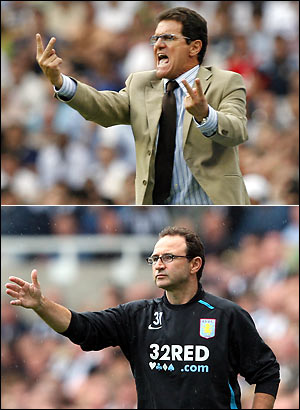
The job no one wants
The divide between club and country is the defining fault line of the modern game. In England in 2007, the divide is more pronounced than ever.
England's failure to qualify for Euro 2008 has highlighted how success at club level may be inhibiting progress at international level.
The Premier League, with its frenetic, high-tempo action, is pulling in fans from around the globe, not to mention investor-speculators keen to cash in. English clubs are progressing in European competition, too. The Premier League provided three of the four semifinalists of last season's Champions League.
But the success at the club level has coincided with a national-team malaise many people are now blaming on the number of foreign players in the Premier League. Mercenary foreigners are taking the places that should be going to young English players, so the argument goes.
I don't accept that argument at all. The best English players -- the likes of Wayne Rooney, Steven Gerrard, Frank Lampard, John Terry -- are playing at the highest level every week for their clubs. They are proof the cream will always rise to the top. The problem for English soccer is not enough cream is being produced in the first place.
Few questions are being asked about why English soccer doesn't produce enough players with with the sort of technique and tactical awareness Croatia demonstrated when it eliminated England from Euro qualifying at Wembley last month. Not enough people are asking why 10-year-old kids in England play on full-size pitches. Not enough people are asking why parents are allowed to scream abuse at kids from the touchline.
Instead, the quick fix for English soccer is to appoint a national-team coach who can knock the team into shape. Someone who can succeed where Steve McClaren failed.
The Football Association is currently, we are led to believe, conducting an exhaustive search for McClaren's successor. The $5 million annual-salary paid to McClaren is likely to be offered to the right man, making him the best-paid national coach in the world.
Trouble is, at the moment, it's the job nobody wants. Arsène Wenger, many people's first choice, quickly ruled himself out. Martin O'Neill, who lost out to McClaren, said he did not want to be considered this time around. Luiz Felipe Scolari, who was targeted last time, is under contract with Portugal.
The problem with the whole process is that it tends to be a reaction to the previous appointment. When Sven-Göran Eriksson was appointed in 2001, the FA wanted a someone with greater tactical nous than Kevin Keegan. When McClaren succeeded Eriksson, a Swede, he did so because he was English.
The same applies to the appointment process. When Eriksson was appointed, the process was a discreet affair, with Eriksson's agent receiving a phone call shortly after Keegan resigned following England's defeat to Germany at the old Wembley. In contrast, McClaren was appointed after a lengthy interview process in which candidates were invited to compete for the job as if they were being considered to be CEO of a multinational company.
But FA chief executive Brian Barwick was caught traveling to Lisbon to speak to Scolari, who insisted on staying with Portugal and the FA was bounced into appointing McClaren, the second choice. So this time around, the FA has now reverted to a more discreet approach in the search for McClaren's successor.
Barwick is now consulting with the great and the good of English soccer, and Graham Taylor.
There are precious few English candidates. Roy Hodgson, who did such a good job with Finland in the Euro 2008 qualifiers, should have come into contention, but he recently took an executive technical post at Inter Milan.
O'Neill may yet be persuaded to change his mind. The Aston Villa manager was hardly going to bite the FA's hand off after his previous experience, when he apparently declined to answer questions about youth development during the FA interview process. He insisted that he would concentrate on coaching the national side and let others handle technical development.
The only high-profile candidate to declare for the job has been Fabio Capello. He has an outstanding record at club level, with AC Milan, Juventus and Real Madrid, but speaks no English (though that could be an advantage in helping to ignore negative media coverage).
Former Chelsea manager José Mourinho has hinted he would listen to an approach, but he could be too much of a loose cannon. Instead he could be using an offer from England to smoke out a big club deal with Barcelona, Real Madrid or Milan.
Former Germany coach Jürgen Klinsmann is also interested in a return to soccer, having come close to taking the U.S. national-team job last year. In contrast to the USSF, the FA would not balk at his demands, but he would need a strong No. 2.
But whoever gets the job, the fundamental problems of English soccer will remain for the foreseeable future.
Gavin Hamilton is the editor in chief ofWorld Soccer Magazine. He contributes to SI.com on alternate Tuesdays.





